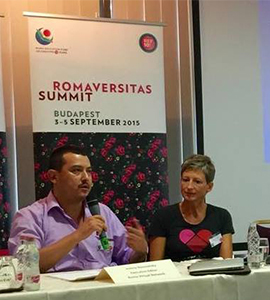|
Before discovering the Armenian Virtual College, Valery Novoselsky had known only some basic Armenian phrases, including some expressions of love, that he learned from Armenian friends. Today, Valery has expanded that knowledge to include history, architecture, language, as well as music, by enrolling in AVC’s online courses and has completed advanced levels for most of them.
Growing up in Dnepropetrovsk, Ukraine, Valery recalled that even though there was no significant Armenian population, he had always been socially connected with Armenians throughout his life: “We were citizens of the same country during the times of the Soviet Union.“ This influence later on grew into stronger ties with Armenians as he moved to Moscow and later to Haifa. He grew up with Armenian neighbours, school mates, and friends, and eventually developed an interest in Armenia’s culture and history. In October 2011, a quick online search led him to discover Armenian Virtual College, and after viewing the course list, Valery knew he had found what he was looking for.
|

|